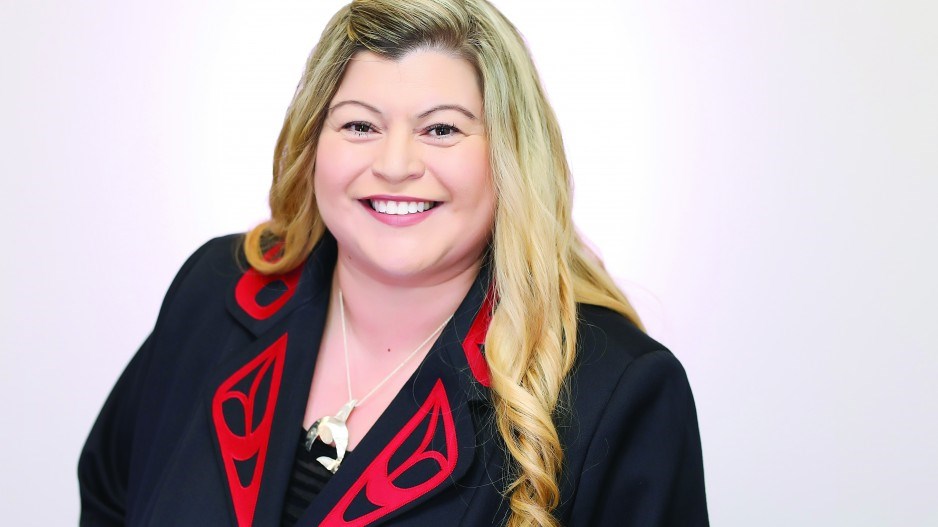“That’s digging deep into the archives,” muses Celeste Haldane when asked about what led her to pursue law as a career.
It wasn’t treaties or trials, though today she is immersed in bringing about the former and has gained experience in the latter through criminal defence work and civil litigation.
A variety of factors led the BC Treaty Commission’s new chief commissioner to law, but for the most part, it starts with the study of anthropology.
“I consider myself both an anthropologist and a lawyer,” said Haldane, who is blending both disciplines in her doctoral work at the University of British Columbia (UBC).
She could probably be considered an academic as well, with three degrees to her name and a fourth pending, though it’s clear that it’s the application and practice of knowledge that drive her.
“I’m now bringing both my worlds together,” she said.
Haldane enrolled as a mature student at Langara College in the mid-1990s after taking several years off after high school. As an anthropology student, she studied culture and, in particular, the diversity of First Nations cultures in British Columbia.
“Really at an early age I think I was exposed to issues around aboriginal title and rights, but it started really with a conversation with one of my professors that I had in anthropology,” she said.
That conversation encouraged Haldane to look at bridging her anthropology studies into a legal career. After finishing her undergraduate degree at UBC, she pursued a degree in law at the university, which has helped give her “a more rounded perspective,” she said.
“I think it enables me to be able to advocate and push a little bit further and a little bit deeper because I do come at it from a very full perspective,” she said.
“Having that anthropological lens adds a different perspective when I’m engaging with communities, when I’m learning from communities, and how I actually approach gaining knowledge from communities.”
Haldane grew up on the outskirts of the Lower Mainland, away from the Musqueam and Metlakatla communities to which her family traditionally belonged, but still very much connected to them.
It’s a different environment for indigenous youth growing up today, compared with the one experienced by those growing up in the ’70s and ’80s.
“I have to say things were quite different than they are now when it came to even identifying as an indigenous person,” she said. “I recall not having a lot – I think maybe two lines – in my social studies textbook about indigenous people in Canada.”
While Haldane’s post-secondary studies would later fill any gaps in understanding when it comes to B.C. and Canada’s diverse indigenous landscape, the chief commissioner’s own life and upbringing provided its own anthropological insights.
“I grew up in a commercial fishing family. I actually for a number of years as a teenager used to commercial seine fish with my father.”
This was around the time the R. vs. Sparrow case was making its way through the Canadian court system.
The case, which was sparked by Musqueam band member Ronald Sparrow’s arrest for fishing longer than was permitted by his licence, culminated in a Supreme Court of Canada decision that shed light on existing aboriginal rights, and brought greater definition to those rights as defined under Section 35 of the Constitution.
“Being immersed in my community, which is Musqueam and Metlakatla, having an understanding of how important fisheries resources is, but really understanding our cultural connection to our land and our community, [I wanted] to be able to pursue a legal career so I could assist nations, and including my own First Nation,” she said.
Now in a position to do that, Haldane keeps those values, along with reconciliation between aboriginal and non-aboriginal peoples, front of mind.
“That’s what drives me in the work that I do,” said Haldane, adding that 10 First Nations representing 20 Indian Act bands are close to completing treaty discussions with the BC Treaty Commission.
Her many other roles, past and present, have also put her in a position to effect change.
Haldane serves as chair of the Legal Services Society and as an advisory committee member for the Musqueam Indian Band. She served as a commissioner and as acting chief commissioner with the BC Treaty Commission prior to the start of her current three-year appointment in April.
She’s also a mother of three – ages 22, 18 and nine – and a grandmother to two.
“I’ve instilled that they are proud of their heritage, they’re proud of their communities that they come from,” she said. “That’s your legacy.”•




